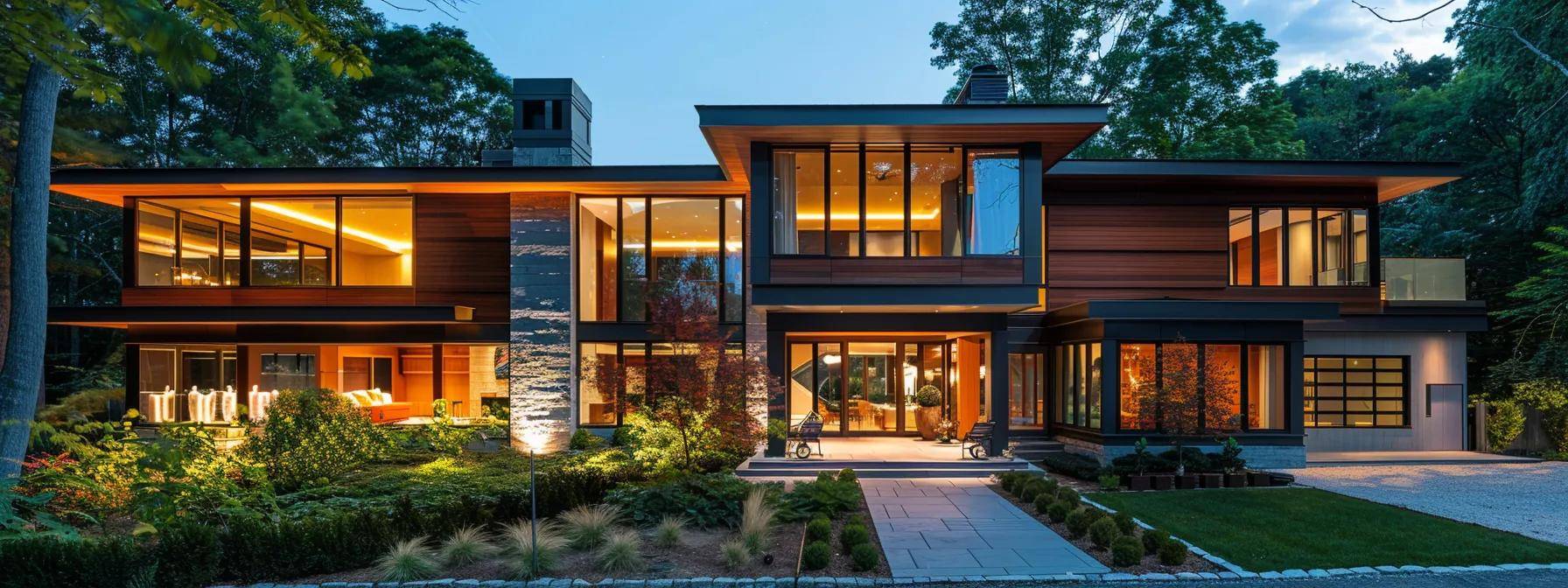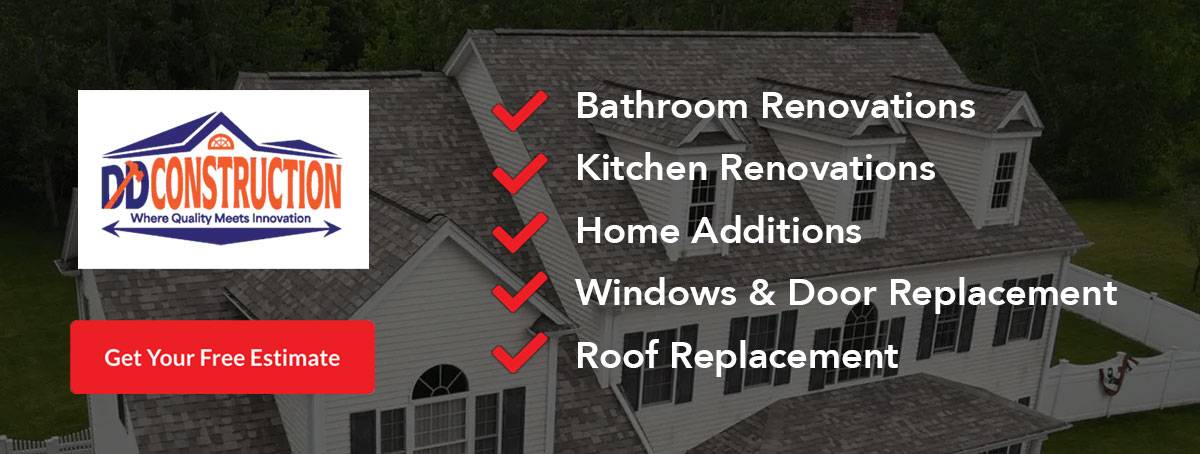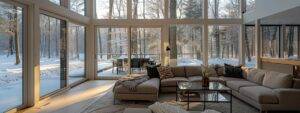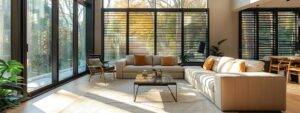Replacing old windows is a major home improvement project that can transform both the energy performance and aesthetic appeal of a property. In Massachusetts, where weather conditions can be extreme—from frigid winters to humid summers—upgrading windows is not only an essential investment in improving comfort but also in reducing energy costs. Homeowners often face issues such as drafts, high utility bills, water leaks, and noise pollution, making window replacement a practical solution to enhance quality of life. Quality window installation, often facilitated by dd construction, can lead to improved airflow and ventilation, reduced reliance on heating systems, and even increased property value. With modern windows offering features like energy rating certifications, improved insulation, and low-maintenance materials, the benefits stretch from immediate comfort gains to long-term savings on energy expenses and repair costs.
Investing in new windows today is a decision backed by a growing demand for energy efficiency and sustainable living practices. Home improvement experts confirm that replacing windows significantly reduces greenhouse gas emissions by cutting down on the energy used to heat and cool homes. Additionally, technological advancements in window construction—such as double or triple glazing, low-emissivity (Low-E) coatings, and improved framing systems—offer superior performance compared to older models. For homeowners in Massachusetts, this upgrade not only leads to a warmer, quieter, and more comfortable home environment but also helps meet state and federal energy standards, potentially qualifying for rebates and tax credits.
New windows also provide a fresh aesthetic update to any home exterior, contributing to a modern appearance that increases curb appeal and property value. With a variety of popular styles available—from double-hung to casement and bay windows—homeowners can choose options that best fit their design goals and architectural style. Furthermore, new window materials such as vinyl, wood, fiberglass, and aluminum offer differing benefits in maintenance, durability, and energy efficiency.
The purpose of this article is to guide Massachusetts homeowners through the key benefits of window replacement, explain the different types and materials available, and detail the replacement process in the state. The following sections answer common questions related to energy efficiency, cost considerations, installation techniques, and selecting the right service provider. By exploring these topics in depth, homeowners can make informed decisions about their window replacement projects and ultimately enjoy a more comfortable, efficient, and attractive home.
What Are the Key Benefits of Window Replacement Today?
Window replacement today offers numerous advantages that touch on energy efficiency, aesthetics, and even environmental sustainability. The primary benefits include enhanced thermal performance, reduced energy bills, increased home value, and improved comfort and safety for occupants.
How Does Window Replacement Improve Energy Efficiency?
Replacing old, inefficient windows with modern, energy-efficient models plays a pivotal role in reducing heat loss during winter and heat gain during summer. New windows may be equipped with double or triple glazing, Low-E coatings, and insulated frames that together maintain consistent indoor temperatures. This ensures that less energy is wasted on heating or cooling the home, thereby lowering utility costs and reducing the overall carbon footprint. For example, Energy Star-certified windows can reduce heating and cooling expenses by up to 30%, which translates into significant savings over time. The improved sealing and insulation help prevent drafts and moisture ingress, minimizing condensation and avoiding potential structural damage. Homeowners report an immediate improvement in comfort, along with a quieter living environment due to the noise-reducing qualities of insulated glass. In Massachusetts, where energy prices are high and winters can be severe, these proactive upgrades are especially beneficial. The precise calibration of U-Factor and R-Value ratings in new windows directly impacts energy performance, ensuring maximum insulation and thermal efficiency.
In What Ways Can New Windows Increase Your Home’s Value?
New windows are universally recognized as a strong selling point for any property. Upgrades in windows not only enhance curb appeal but also add tangible value to the home. Studies indicate that energy-efficient home improvements, such as window replacement, can return up to 70% of the investment at resale. Buyers are increasingly attracted to homes that promise low utility costs, reduced maintenance, and modern aesthetics. In competitive markets like Greater Boston, having attractive, secure, and efficient windows can be a significant differentiator. Quality windows provide a modern look that blends with both traditional and contemporary home designs, often increasing the overall market appraisal. Additionally, financing programs such as the Mass Save program offer rebates that can make the investment even more attractive. Homeowners benefit from a higher property appraisal value, reduced time on the market when selling, and lower future energy costs—factors that together contribute to a significant return on investment.
How Does Window Replacement Enhance Home Aesthetics and Comfort?
The visual impact of new windows transcends mere functionality. Replacement windows are available in an array of styles and finishes that can complement the architectural design of any home. Whether homeowners prefer the classic appeal of double-hung windows, the sleek look of casement windows, or the expansive views offered by bay windows, modern designs ensure a cohesive, updated appearance. New windows not only improve outdoor views but also provide better internal lighting by allowing more natural daylight to enter, creating a warm and inviting atmosphere. Enhanced comfort comes from reduced drafts, lower noise levels, and improved air quality due to better sealing against external pollutants. The increased reliability of modern window systems reduces the likelihood of leaks and water damage, enhancing the overall durability of the home. The fusion of design and functionality results in spaces that are more reflective of personal lifestyle and taste while also offering a secure, insulated, and comfortable living environment.
What Are the Environmental Benefits of Upgrading Your Windows?
Upgrading windows is a sustainable investment that supports environmental preservation by promoting energy efficiency and reducing greenhouse gas emissions. New windows minimize the energy required for heating and cooling by maintaining stable indoor temperatures, thereby lowering the usage of fossil fuels and lowering carbon footprints. In Massachusetts, home improvement projects that focus on energy efficiency are increasingly aligned with state and national environmental goals. Modern windows use advanced insulating technologies and recyclable materials, and many manufacturers emphasize sustainable production processes. As a result, homeowners not only enjoy cost savings and increased comfort but also contribute positively to environmental stewardship. Enhanced insulation and energy savings lead to fewer emissions, which is critical in mitigating the impact of climate change. Additionally, by qualifying for various energy rebates and tax credits, homeowners are encouraged to adopt green technologies that support long-term ecological benefits.
Which Window Types Are Best for Replacement in Massachusetts?

Massachusetts homeowners are presented with a broad selection of window types tailored to meet varying aesthetic and functional requirements. Some window types are better suited for the harsh New England climate, while others cater to architectural styles ranging from colonial to modern. Understanding these options is essential to choose windows that maximize energy efficiency, durability, and overall performance.
What Are the Advantages of Double-Hung Windows?
Double-hung windows remain one of the most popular choices for replacement due to their versatility and ease of operation. These windows feature two sashes that move vertically, allowing both top and bottom portions to open for improved ventilation. Their design not only facilitates easy cleaning but also provides enhanced insulation when properly sealed. Homeowners find double-hung windows advantageous because they offer a classic look and facilitate optimal airflow control. With modern improvements, these windows now incorporate low-E coatings and gas fills between panes, increasing energy efficiency significantly. They are particularly effective at preventing heat loss during cold Massachusetts winters while allowing ample natural light to illuminate interiors. Additionally, the option to replace traditionally wooden frames with vinyl or fiberglass enhances durability and reduces long-term maintenance costs. Their design simplicity and timeless appearance make them a go-to option for many renovations.
How Do Casement Windows Compare for Energy Efficiency?
Casement windows offer a distinct advantage when it comes to energy efficiency because they seal tightly when closed. Hinged at the side, these windows open outward like a door, ensuring that the entire window surface contributes to insulation. The tight sealing mechanism minimizes air leakage significantly, which is critical in maintaining steady indoor temperatures in regions such as Massachusetts with extreme seasonal variations. Their operability through crank mechanisms allows for easy use, providing maximum ventilation without compromising on energy performance. When paired with modern materials and insulating features, casement windows are often rated with one of the lowest U-factors available, meaning they are exceptionally effective at reducing unwanted heat exchange between interior and exterior environments. This tight seal also offers enhanced protection against wind-driven rain and external noise, making them a favorite among homeowners looking for high-performance window solutions.
When Should You Choose Bay or Slider Windows?
Bay windows and slider windows serve different purposes and can transform a home’s aesthetic appeal. Bay windows extend outward from the wall, creating a small shelf area that enhances the interior space and provides panoramic views. They are particularly valued for their charming architectural appeal and ability to invite more natural light into a room. Slider windows, on the other hand, operate by sliding horizontally and are known for their ease of use and space-saving design. Massachusetts homeowners might choose bay windows when looking for a dramatic feature to boost curb appeal and add a touch of elegance to living spaces. Conversely, slider windows are ideal for contemporary homes or areas where space is limited, as they offer unobstructed views and efficient operation without requiring additional interior clearance. Both types can be energy efficient when constructed with modern glazing and accurately installed, but the choice ultimately depends on design preference and spatial requirements.
How Do Window Types Affect Installation and Cost?
The installation process and overall cost of window replacement vary significantly based on the type and materials selected. For example, standard double-hung windows tend to have lower installation and material costs compared to more complex window styles such as bay or slider windows. Casement windows, although highly efficient, require precise installation to ensure optimal sealing, which can impact labor costs. Newer technologies and custom shapes may also increase costs due to the need for specialized installation services. Additionally, the choice of material—whether vinyl, wood, fiberglass, or aluminum—affects both initial cost and maintenance expenses over time. Vinyl windows generally offer a cost-effective solution with low maintenance, while wood windows might provide superior aesthetics but at a higher price point and upkeep requirements. Homeowners should consider not only the upfront investment but also the long-term savings in energy costs and durability when selecting window types.
What Window Materials Should You Consider for Replacement?
Choosing the right window material is a crucial aspect of any replacement project because materials affect energy performance, durability, appearance, and maintenance needs. Homeowners in Massachusetts have several options ranging from vinyl and wood to fiberglass and aluminum. Each material has unique properties that cater to different performance and aesthetic requirements, making it important to align selection with specific home improvement goals.
Why Are Vinyl Windows Popular for Replacement?
Vinyl windows have become a top choice for many Massachusetts homeowners, primarily because of their excellent thermal performance, low maintenance, and cost-effectiveness. Made from polyvinyl chloride (PVC), these windows are engineered to be highly resistant to weather extremes, which is particularly beneficial in New England climates. Vinyl windows typically come with multiple chambers in the frame that enhance insulation properties and reduce air leakage. They are low-maintenance, as they do not require painting or extensive cleaning, and their inherent durability means they can withstand frost, high winds, and heavy rain without deteriorating. Additionally, the availability of a wide variety of colors and styles means vinyl windows can suit virtually any home design while also improving energy efficiency when fitted with modern double or triple glazing. Their affordability relative to other materials makes them a practical and appealing option, especially when paired with government rebate programs like Mass Save.
What Are the Benefits of Wood and Fiberglass Windows?
Wood and fiberglass windows offer a blend of traditional aesthetics and modern performance. Wood windows provide a warm, natural look that many homeowners find highly desirable. They offer excellent insulating properties, but they typically require more maintenance than vinyl windows, such as periodic painting or staining to protect against moisture and rot. On the other hand, fiberglass windows combine the best aspects of wood appearance with superior durability and lower maintenance needs. Resistant to temperature fluctuations and less susceptible to warping, fiberglass windows maintain their structural integrity over time, even in harsh weather conditions. Both materials can be equipped with advanced glazing options to maximize energy efficiency. For homeowners who prioritize style and are willing to invest in additional upkeep for a classic appearance, wood windows are an ideal choice. Fiberglass, however, is better suited for those seeking a high-performance, low-maintenance solution with a refined look.
How Does Aluminum Compare for Window Replacement?
Aluminum windows are known for their strength and slim profiles, which allow for larger panes of glass and maximized views. Although aluminum is typically less energy efficient than vinyl, wood, or fiberglass, advancements in thermal breaks and improved glazing techniques have significantly enhanced their performance. The lightweight nature of aluminum also permits a modern, sleek aesthetic that is particularly popular in contemporary designs. However, aluminum tends to conduct heat more readily than other materials, which can lead to energy losses if not properly insulated. Homeowners considering aluminum should look for models that feature thermal breaks or are paired with double or triple glazing to mitigate these drawbacks. In Massachusetts, where the climate demands high energy efficiency, aluminum windows are best suited as part of a design that complements other energy-saving measures.
How Do Materials Impact Energy Savings and Maintenance?
The impact of window materials on energy savings and maintenance is profound. Vinyl and fiberglass options, with their superior insulating properties, tend to offer the best energy savings by effectively reducing unwanted heat transfer. Wood can also be an excellent insulator, though its maintenance requirements are higher, potentially adding to the overall lifetime cost. Aluminum, while providing sleek aesthetics, requires additional features to meet energy efficiency standards. Furthermore, maintenance considerations such as susceptibility to rot, warping, or corrosion must be factored in. Vinyl windows are generally the easiest to maintain, requiring minimal cleaning and no painting, while wood may need regular upkeep to protect its natural beauty. Fiberglass windows strike a balance by offering both energy efficiency and durability with minimal maintenance demands. The long-term energy savings, as well as upkeep costs, should guide homeowners in selecting the window material that best fits their lifestyle and budget.
What Does Window Replacement Cost in Massachusetts?

Understanding the cost of window replacement in Massachusetts involves more than just the sticker price. Numerous factors influence the overall expense, including the type of windows, materials used, installation complexity, and any additional upgrades or customizations. Homeowners should consider both the initial cost and the long-term savings that come from improved energy efficiency and reduced maintenance requirements.
What Factors Influence the Cost of Window Replacement?
Several key variables affect the cost of window replacement in Massachusetts. The size, style, and type of window selected—such as double-hung, casement, bay, or slider—play a significant role. Materials are another critical factor; for instance, vinyl windows are typically less expensive than wood or fiberglass options. The complexity of the installation process, including whether the project is a full-frame replacement or involves altering the structure, also impacts the price. Labor costs can vary by region, and some costs may be offset by utility rebates or state incentives like those offered through the Mass Save program. Other factors include accessibility, weather conditions during installation, and any custom design requirements that may require specialized installation techniques. Homeowners should request detailed quotes from reputable contractors to understand the full breakdown of costs, including potential hidden fees.
Are There Financing Options Available for Window Replacement?
Financing options are available for homeowners looking to update their windows, making it easier to manage the initial cost of replacement. Many contractors and financial institutions offer low-interest loans, payment plans, or even promotional rates that spread out the expense over time. Additionally, government programs such as the Mass Save energy efficiency incentives provide rebates and tax credits for energy-efficient improvements, which can significantly offset the upfront investment. These financing arrangements allow homeowners to begin enjoying the benefits of new windows immediately while deferring some of the financial impact. By taking advantage of these programs, residents of Massachusetts not only improve home comfort and efficiency but also boost the long-term return on investment through lower energy bills and increased property value.
How Can You Get an Accurate Window Replacement Quote?
Securing an accurate quote for window replacement involves several steps. Homeowners should start by researching reputable window replacement companies with a proven track record in Massachusetts. Requesting multiple quotes allows for comparisons of product quality, material options, and installation services. A thorough in-home consultation typically involves an assessment of the existing window conditions, measurements, and any structural issues that could affect the installation. It is crucial to communicate specific requirements, such as energy efficiency ratings or historical renovation constraints, to ensure the quote reflects all necessary work. Detailed quotes should itemize costs for materials, labor, permits, and any additional features like custom finishes or enhanced insulation measures. An accurate quote not only sets a realistic budget but also ensures that homeowners understand the scope of the project and the long-term benefits of their investment.
| Factor | Description | Impact on Cost | Example |
|---|---|---|---|
| Window Type | Double-hung, casement, bay, slider | Varies by design complexity | Double-hung typically lower cost than bay windows |
| Material | Vinyl, wood, fiberglass, aluminum | Affects insulation, durability | Vinyl is cost-effective; wood requires maintenance |
| Installation | Full-frame vs. pocket replacement | Full-frame can be more expensive | Full replacement involves structural work |
| Labor | Regional pricing and contractor expertise | Affects overall bill | Experienced contractors may charge a premium |
| Extras | Custom finishes, energy-efficient upgrades | Enhances performance but increases cost | Low-E coating or triple glazing |
| Financing/Incentives | Rebates, tax credits, financing options | Can reduce net cost | Mass Save rebates lower upfront investment |
The table above summarizes the main factors that drive window replacement costs. Homeowners should analyze these aspects in the context of their specific needs to arrive at an informed decision and budget effectively for their project.
What Is the Typical Window Replacement Process in Massachusetts?
The process of window replacement in Massachusetts follows a series of well-established steps designed to ensure high quality, adherence to building codes, and customer satisfaction. From the initial consultation through installation and post-installation support, each phase is critical to the long-term performance and appearance of the windows.
How Long Does Window Replacement Usually Take?
The time required for a complete window replacement can vary widely depending on the scope of the project, the number of windows being replaced, and external factors such as weather conditions or building accessibility. On average, a full window replacement project for a typical single-family home in Massachusetts may take anywhere from a few days to two weeks. This timeframe includes initial consultations, measurements, ordering the custom windows, installation, and any necessary finishing work such as trimming or caulking. In cases where complex or custom windows are involved, the timeline may extend due to additional design and manufacturing considerations. Homeowners are advised to schedule the work during periods of favorable weather to ensure smooth installation and optimal performance of the new windows.
What Steps Are Involved in Professional Window Installation?
Professional window installation in Massachusetts involves several essential steps that ensure both quality and compliance with local building codes. The process begins with an in-home consultation and assessment, during which a professional measures the existing windows and inspects the overall condition of the window frames and surrounding structures. Next, detailed product recommendations and quotes are provided based on the homeowner’s preferences and the unique characteristics of the property. After product selection, the contractor schedules the installation. During installation, old windows are carefully removed, followed by necessary repairs to the window frames and opening areas to address any water damage or structural issues. New windows are then installed using precision techniques such as leveling, shimming, and securely anchoring to the building façade. The installation concludes with sealing and insulation procedures, ensuring maximum energy efficiency, followed by a comprehensive inspection to verify compliance with Massachusetts building codes and manufacturer guidelines.
How Do Massachusetts Building Codes Affect Window Replacement?
Massachusetts building codes are stringent when it comes to window replacement, ensuring that all installations meet or exceed standards for energy efficiency, safety, and performance. The codes dictate various aspects such as the type of glazing, insulation properties, installation methods, and safety features like tempered glass in areas prone to impact. Compliance with these regulations is critical not only for the structural integrity and energy performance of the windows but also for ensuring that the property meets resale criteria and qualifies for state or federal rebates. Professional contractors are well-versed in these codes and will incorporate required measures during installation, reducing the likelihood of complications during inspections and future maintenance issues.
What Warranties and Post-Installation Support Should You Expect?
When undertaking a window replacement project, homeowners should expect comprehensive warranties that cover both products and labor. Reputable companies in Massachusetts typically offer warranties ranging from 10 to 20 years on window frames, glass, and installation services. Such warranties provide peace of mind by offering repairs or replacements should defects or installation issues arise. Furthermore, post-installation support includes troubleshooting assistance, routine maintenance recommendations, and responsive customer service. Many contractors offer annual check-up services to ensure that the window seals and insulation remain effective over time. Homeowners are encouraged to review warranty details carefully and ensure that any work completed meets the stipulated terms to fully benefit from the long-term protection provided by quality window replacement services.
How Do You Choose the Right Window Replacement Company in Massachusetts?

Deciding on the ideal window replacement company can be a daunting task given the numerous options available. It is critical for Massachusetts homeowners to carefully evaluate potential contractors based on their expertise, local experience, customer reviews, and adherence to industry certifications. An informed decision is crucial for guaranteeing a high-performing, durable window installation that meets all building codes and personal style requirements. Ensuring that the company has a proven track record and offers transparent pricing will contribute significantly to the overall success of the project.
What Qualifications and Certifications Should Installers Have?
When selecting a window replacement company, homeowners should inquire about the certifications and qualifications of the installers. Professionals should be certified by relevant industry authorities such as the National Glass Association (NGA) or local state licensing boards. Certifications often indicate that the company adheres to best practices, adheres to rigorous standards for energy efficiency, and employs experienced technicians. Additionally, specialized training in the installation of various window materials and styles is a mark of quality that can enhance performance and reduce the likelihood of installation errors. Companies that invest in professional development often have longer warranties and robust customer support, which ultimately translates to better long-term performance of the windows.
Why Is Local Experience Important for Window Replacement?
Local experience plays a critical role in ensuring that window replacement projects adhere to specific building codes and climate-related concerns. Contractors who work regularly in Massachusetts are well-acquainted with regional weather patterns, energy efficiency standards, and local permit requirements, which can vary from those in other states. Their familiarity with the local landscape enables them to anticipate common issues, such as moisture management and proper sealing against harsh winters, ensuring a smoother installation process and longer-lasting results. Homeowners can rest assured that locally experienced contractors possess the practical knowledge to deliver results that align closely with environmental conditions unique to Massachusetts.
How Can Customer Reviews and Testimonials Guide Your Choice?
Customer reviews and testimonials offer valuable insights into the reliability, workmanship, and customer service provided by window replacement companies. Reviews reflect the experiences of previous clients and can help prospective homeowners gauge the quality of work delivered by a contractor. It is beneficial to research multiple sources, including third-party review sites and local community forums, to get an overall picture of each company’s performance. Testimonials that highlight aspects such as adherence to schedules, transparency in pricing, and effective problem resolution are strong indicators of a company’s commitment to customer satisfaction. These firsthand accounts are invaluable in making an informed decision and aligning expectations with the contractor’s promise.
What Questions Should You Ask Before Hiring a Window Replacement Service?
Before finalizing a contract with a window replacement company, it is essential to ask detailed, specific questions regarding the installation process, warranty coverage, material options, and any additional services offered. For example, homeowners should inquire about the expected timeline for the project, the methods used to ensure proper insulation and sealing, and how the company handles unforeseen issues such as structural repairs. Questioning the pricing structure—whether there are additional fees for disposal of old materials or custom installation requirements—is also crucial. A reputable company will be forthcoming and provide clear, comprehensive answers that build trust and demonstrate expertise in window replacement solutions tailored for Massachusetts homes.
What Are the Energy Efficiency Trends and Incentives for Window Replacement?
As energy costs rise and environmental concerns become increasingly central to home improvement decisions, energy efficiency is one of the most important factors influencing window replacement in Massachusetts. Innovations in window technology and a host of government incentives continue to drive homeowners toward more energy-efficient solutions. This section explores current trends, efficiency standards, and available incentives that can help reduce costs while contributing to environmental sustainability.
How Do Energy Star Certified Windows Save Money?
Energy Star certified windows meet stringent energy efficiency standards and serve as a benchmark for quality performance, helping save money by reducing the demand on heating and cooling systems. These windows incorporate advanced glazing techniques, thermal coatings, and improved frame designs that minimize heat loss and draft infiltration. In practical terms, Energy Star windows can reduce energy bills by preventing excessive heat escape during cold winters and maintaining a stable indoor temperature in summer, thereby reducing the need for artificial heating and cooling. Homeowners may see utility savings of up to 30% over time, and these savings can be further enhanced when windows are part of a comprehensive energy retrofit program. For many, the tangible cost reductions, combined with enhanced indoor comfort and environmental benefits, make Energy Star windows a compelling choice.
What Are U-Factor and R-Value Ratings and Why Do They Matter?
U-Factor and R-Value ratings are critical metrics used to gauge the energy efficiency of windows. The U-Factor measures the rate of heat transfer and indicates how well a window insulates; lower U-Factor values signify better insulation capabilities. Conversely, the R-Value measures thermal resistance, with higher values indicating superior insulation performance. In Massachusetts, where extreme temperatures are common, understanding these ratings is essential for selecting windows that can deliver substantial energy savings. Homeowners should look for windows with low U-Factor and high R-Value ratings to ensure that their new installations contribute effectively to reducing energy consumption, improve indoor comfort, and support lower utility bills. These standardized measurements provide a reliable basis for comparing products and making informed decisions that align with both performance goals and budget constraints.
Are There Local or State Incentives for Energy-Efficient Window Replacement?
Massachusetts offers a variety of local and state incentives designed to encourage homeowners to invest in energy-efficient window replacements. Programs such as the Mass Save program provide rebates, tax credits, and low-interest financing options to offset the upfront cost of new windows that meet energy efficiency standards. These incentives not only make it more financially feasible to upgrade but also stimulate the adoption of technology that reduces greenhouse gas emissions and overall energy consumption. In addition, certain municipalities may offer additional grant programs or utility company rebates, further reducing the net cost. Homeowners are encouraged to research locally available programs and consult with their window replacement contractor, who can often provide guidance on qualifying for these incentives and maximizing the financial benefits.
How Does Window Replacement Contribute to Environmental Sustainability?
Upgrading windows is a tangible step toward environmental sustainability, as modern window systems are designed to significantly reduce energy waste and lower the overall carbon footprint of a home. By improving the insulation and sealing of windows, homeowners reduce the reliance on heating and cooling systems, which in turn decreases the consumption of fossil fuels and emissions associated with electrical power generation. The cumulative energy savings contribute directly to lower greenhouse gas emissions and a reduced environmental impact over time. Moreover, many new windows incorporate sustainable manufacturing practices and materials that are recyclable, further supporting eco-friendly building practices. With increasing emphasis on reducing energy waste and preserving environmental resources, window replacement stands out as an essential investment in both home comfort and the long-term health of our planet.
Frequently Asked Questions
Q: What is the primary benefit of replacing old windows in Massachusetts? A: The primary benefit of window replacement is improved energy efficiency. New windows, especially those that are Energy Star-certified, reduce heat loss in the winter and heat gain in the summer. This leads to lower utility bills, enhanced indoor comfort, and decreased wear on heating and cooling systems, which is particularly important in Massachusetts’ variable climate.
Q: How do Energy Star certified windows contribute to cost savings? A: Energy Star certified windows are designed with advanced insulation technologies—such as double or triple glazing, low-emissivity coatings, and insulated frames—that lower energy consumption. Homeowners typically see energy bill reductions of up to 30%, which can result in significant savings over time while also contributing to a more sustainable home environment.
Q: What factors should homeowners consider when selecting window materials for replacement? A: Homeowners should consider factors such as energy efficiency, durability, maintenance requirements, and aesthetics when choosing window materials. Vinyl windows are cost-effective and low maintenance, while wood offers a traditional, attractive look but needs more upkeep. Fiberglass windows combine durability and energy efficiency, and aluminum windows, though modern, require additional insulation to meet efficiency standards in harsh climates.
Q: What types of financing or incentives are available for window replacement projects in Massachusetts? A: Financing options such as low-interest loans and payment plans are commonly available through both contractors and local financial institutions. Additionally, state programs like Mass Save offer rebates and tax credits for energy-efficient home improvements, making window replacement more affordable. Homeowners should consult with reputable contractors to maximize these opportunities.
Q: How does the installation process affect the overall outcome of window replacement? A: The installation process is critical to the performance and longevity of new windows. Proper removal of old windows, careful preparation of the opening, precise leveling, and thorough sealing and insulation are all essential steps. Using experienced, certified installers ensures that the windows meet local building codes and achieve the desired energy efficiency, safety, and aesthetic results, leading to long-term homeowner satisfaction.





